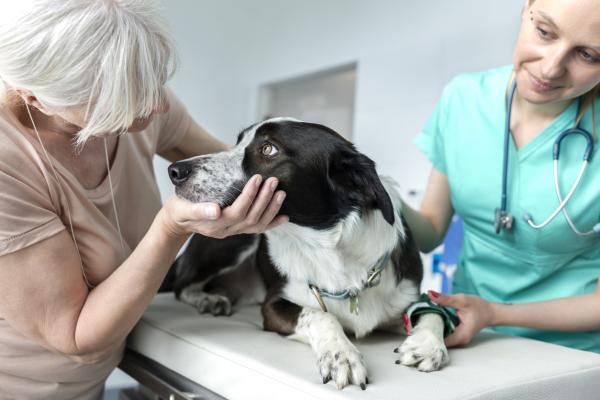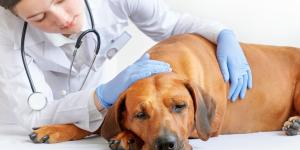Esophagitis in Dogs - Symptoms, Causes, Treatment



See files for Dogs
Esophagitis or inflammation of the esophagus in dogs can caused by many factors, such as hiatal hernias, reflux, parasites, drugs and more. As a dog's caregiver, it's important that we can recognize the symptoms as soon as possible so as to bring our dog to the veterinarian to get properly diagnosed and treated.
Keep reading this AnimalWised article about esophagitis in dogs, where we'll be explaining the symptoms, causes and treatment of this health issue.
Esophagitis in dogs
Esophagitis is an acute or chronic inflammation of the lining of the esophagus. Sometimes it can also affect the submucosal and muscular layer of the esophagus. This esophageal inflammation occurs when the protective barrier of the esophagus is disturbed, which leads to the inflammatory process with erosions or ulcerations. The protective barriers of the mucous layer of the esophagus consists of:
- Mucous gel
- Surface bicarbonate ions
- Stratified squamous epithelium with tight intercellular junctions
Most of the time it occurs due to damage or injury caused by ingested substances, foreign bodies or increased reflux from the stomach into the esophagus.

Causes of esophagitis in dogs
As we have previously mentioned, there are many causes to esophagitis in dogs. With that being said, the main causes of esophagitis in dogs include:
- Anesthetic procedures in the supine position (due to increased gastric content).
- Gastroesophageal reflux.
- Hiatal hernias (can cause gastroesophageal reflux).
- Caustic substances (bleach).
- Drugs: tetracyclines, NSAIDs, ciprofloxacin, clindamycin.
- Vomiting for a long time (chronic).
- Eosinophilic esophagitis in dogs.
- Foreign body pressure necrosis .
- Spirocerca lupi parasitosis, causing a granulomatous esophagitis in dogs, forming granulomas in the wall of the esophagus that grow as they grow parasites inside, pressing the trachea and the aorta and can reach occlude the esophagus.
It's also important to mention that newborn dogs or puppies with congenital hiatal hernia may be at increased risk for reflux esophagitis from the stomach.
Symptoms of esophagitis in dogs
The clinical signs that the dog presents will vary depending on the type of injury, the severity of the inflammation and the involvement or not of other layers of the esophagus. While mild esophagitis can present regurgitation of mucus and phlegm, severe esophagitis can cause so much pain that patients refuse to swallow their own saliva or water.
In general, these are the common symptoms of esophagitis in dogs:
- Neck or throat pain
- Regurgitation
- Salivation
- Extension of the head and neck while swallowing
- Odynophagia (pain when swallowing)
- Reluctance to eat
- Any other difficulty when swallowing food
- Coughing and wheezing (lung sounds) if there is aspiration pneumonia
- Fever
In mild esophagitis, dogs may have no associated clinical signs but you may observe certain discomfort in your dog. This should be enough for you to pay attention to any other symptoms and to take them to the veterinarian for a check-up.

Diagnosis of esophagitis in dogs
To properly diagnose your dog, your veterinarian will need to run certain tests. The first is a blood test. In the blood test, alterations such as leukocytosis and neutrophilia (increase in white blood cells with a special increase in neutrophils) can be seen in cases of severe esophagitis. However, the rest of the blood count and biochemistry parameters should be normal.
Your veterinarian may also take a radiography. On plain radiographs, the esophagus usually appears normal. If there is aspiration pneumonia it could be seen in parts of the lung. If we add contrast with barium, the irregular esophageal mucosa could be seen, with narrowing by segments, with dilatation of the esophagus or hypomotility of the same.
The differential diagnosis of esophagitis in dogs includes:
- Foreign body in the esophagus.
- Stenosis of the esophagus.
- Hiatal hernia.
- Megaesophagus.
- Esophageal diverticulum.
- Vascular ring abnormality.
Endoscopy and biopsy are the best methods for definitive diagnosis because they allow direct observation of the mucosa and its damage, associated problems, and histopathology of the organ:
- Endoscopy is the diagnostic method of choice in severe cases of esophagitis. In these cases, the mucosa will be increased in color (hyperemic) and edematous, with ulcers and bleeding.
- Biopsy will be necessary for milder cases where hardly any changes can be seen with endoscopy.

Treatment for esophagitis in dogs
The pillars of the treatment of this pathology are to reduce the acidity of the stomach, the reflux of its contents and protect the damaged esophageal mucosa. For this, the treatment of esophagitis in dogs may or may not include hospital admission:
- Dogs with mild esophagitis can be managed at home, without requiring admission.
- If the esophagitis is more severe, if they do not eat, are dehydrated or have aspiration pneumonia they may require hospital admission.
In the most serious cases, the medical treatment to follow will be the following:
- Parenteral nutrition through a gastrotomy tube to avoid the esophagus and remove water and food for oral ingestion.
- Inhibitors of gastric secretion such as ranitidine, cimetidine or famotidine to reduce gastroesophageal reflux. However, omeprazole as a proton pump inhibitor is best for reducing stomach acid.
- Metoclopramide stimulates the emptying of the stomach, reducing the volume of gastric contents that can ascend into the esophagus. It has the advantage that it can be administered intravenously.
- Sucralfate in the form of oral suspension is the best treatment for canine esophagitis, they are more specific than tablets since the liquid adheres to the damaged surface of the esophagus and will act much more effectively. In addition, it provides some pain relief if there is discomfort.
- Oral lidocaine for dogs in pain so severe that they won't even swallow their own saliva.
- Broad-spectrum antibiotics should be reserved for the most severe cases of esophagitis to prevent bacterial invasion and infection, or in dogs with aspiration pneumonia.
Prognosis of esophagitis in dogs
The prognosis for dogs with mild esophagitis is usually good. However, in cases of ulcerative esophagitis, the prognosis is more reserved. Esophagitis can be complicated by stricture of the esophagus, and dogs will develop progressive regurgitation, malnutrition, and weight loss.
For all these reasons, it is very important to go to the veterinarian in the presence of the first symptoms and not to self-medicate your dog as their clinical picture could worsen. Therefore, as soon as you see any abnormalities in your dog's behaviour or appearance you must take them to the veterinarian to be properly diagnosed and treated. This way your dog will have a good prognosis for their health issue.
To help you recognize if your dog is sick, watch the video below about 6 most common warning signs that your dog is sick.

This article is purely informative. AnimalWised does not have the authority to prescribe any veterinary treatment or create a diagnosis. We invite you to take your pet to the veterinarian if they are suffering from any condition or pain.
If you want to read similar articles to Esophagitis in Dogs - Symptoms, Causes, Treatment, we recommend you visit our Other health problems category.
- Glaccer. (2018). Esophagitis in dogs and cats . Available at: https://mederilab.com/esophagitis-en-perros-y-gatos/
- RW Nelson. (2020). Small Animal Internal Medicine, 6th Edition. Grupo Asís Biomedia SL
- MD Willard. (2015). Esophageal diseases of the dog and cat. Available at: https://www.portalveterinaria.com/articoli/articulos/26025/enfermedades-esofagicas-del-perro-y-el-gato.html








